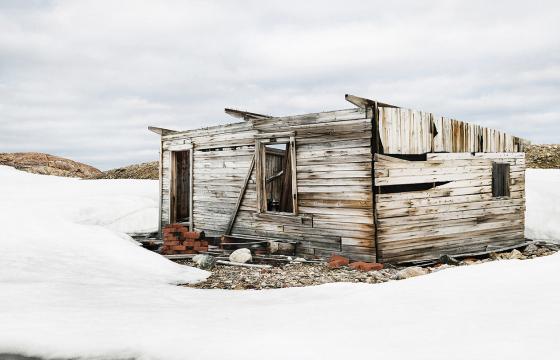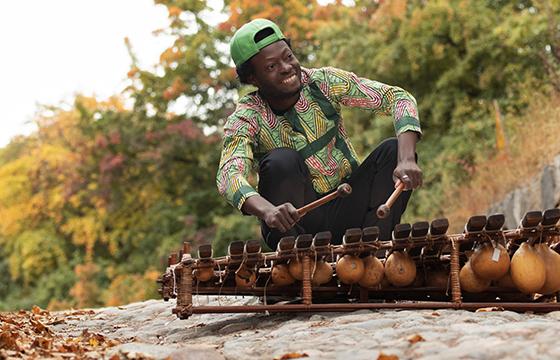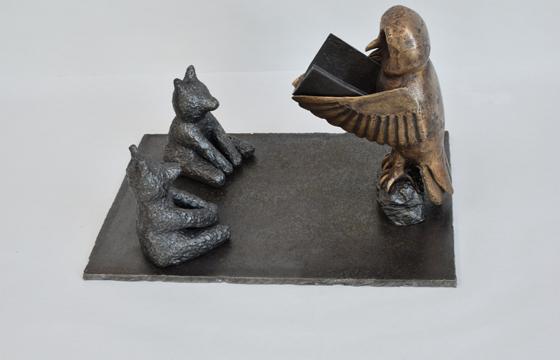
In the photo, Sunny Odom, a Vihti-based undertaker, is floating in the water with his eyes closed. The middle of the photo shows his face as well as a faint outline of his body just under the surface of the water. Otherwise there is nothing in the photo but the surface of the river and its ripples.
– The photograph could be of any place..., says photographer Uwa Iduozee.
– Like Vantaanjoki, for example, chimes in writer Maryan Abdulkarim.
– … but it is of the Niger River, continues Iduozee.
The photograph was on display at the Festival of Political Photography at the Finnish Museum of Photography, but it is more closely connected with Iduozee and Abdulkarim's book project, in which they, in words and through pictures, tell the stories of eight first-generation black immigrants who came to Finland.
These immigrants came to Finland between 1950s-90s from the United States, England, Somalia, Sudan, Ethiopia and Nigeria, and represent the same generation as Iduozee and Abdulkarim's, now in their thirties, parents. The original working title of the book was This is not how I imagined my life.
– Many immigrant tales here often begin by someone arriving in Finland. We wanted to do things differently. We picked, on purpose, people who didn't move here until they were already adults. In their case, they had time to have lots of different dreams before coming to Finland, to where they had to come, for example, to escape civil war, for love, work, study, or for other reasons, explains Abdulkarim.
In her book project, supported by the Kone Foundation, Abdulkarim asked immigrants about their lives prior to moving to Finland and Iduozee photographed them in Finnish surroundings. The authors, however, begun to feel that it was strange to document people's stories only in Finland.
What's more, not everyone's connection to their past life was neatly cut off at the Finnish border. Many regularly still visit their native countries and, in Odum’s case, he runs a hotel back in his hometown.
Therefore, in March 2018, Abdulkarim and Iduozee travelled, with the aid of a 5000-euro mobility grant awarded by the Finnish Cultural Foundation, to Nigeria. They documented Odum's life on the shores of the Niger River in Asaba City, located quite close to a delta, and the life of retired Ike Chime in Enugu, located about a hundred and some miles East of Asaba.
– People are more naked in an environment charged with history and things that may be difficult for them to deal with. You could sense a certain reticence in them at first, when we got to see this side of their life and for example family members who are not always in positions that would evoke pride. It did, however, bring us closer to the subjects of our documentary, says Iduozee.
At one point, Iduozee and Abdulkarim were walking with a group of men, looking at places and houses from their past. These landscapes started to evoke memories in them, something that would probably not have happened in Finland.
Iduozee made it his goal not to have the new environment lure him into becoming side-tracked with documenting landscapes exotic to him.
– I wanted to simplify the visual aspect, just like I would in Finland. The picture of Odum keeping afloat on the Niger River is just like that. It does not depend on its environment but a feeling, Iduozee states.
Iduozee managed to get a similar picture of Chime in Enugu, as he was smelling flowers in the yard of his old home, becoming swept away by his own nostalgia for a moment.
The largest part of the 5000-euro travel grant was spent on flights to and from Finland to Nigeria. The authors were taken aback that travelling in Nigeria was slower and more expensive than they had thought.
In the cities, motorcycle taxies would take you from one place to another for a few euros, but local flights would set you back by a few hundred euros. Long-distance busses were inexpensive, although, at one time, the travellers had to sit on the bus for two hours just to wait for it to get full. Only then did it set out.
A foreigner may not rent a car by themselves in Nigeria, but they must also hire a local driver along with it.
The travellers noticed that there were plenty of police around who regularly pulled cars over to ask for papers. Earlier, there had been a lot of hold-ups on the roads of Nigeria, but the increased visibility of the police has cut them back.
– I was not worried for my safety at any point of the journey. I can pass for a local quite well as long as I don't open my mouth, says Abdulkarim.
More information on Mobility Grants




